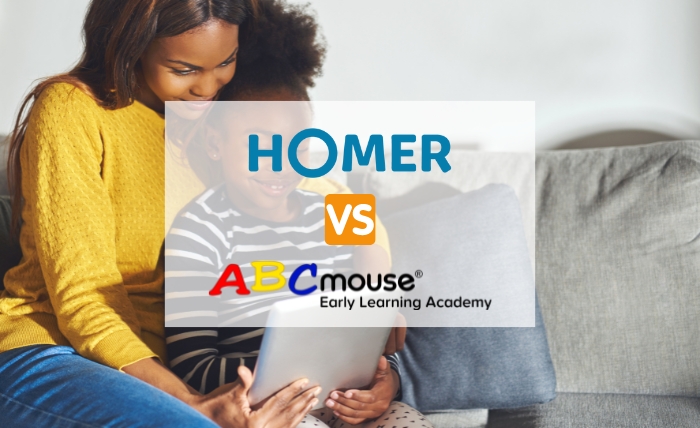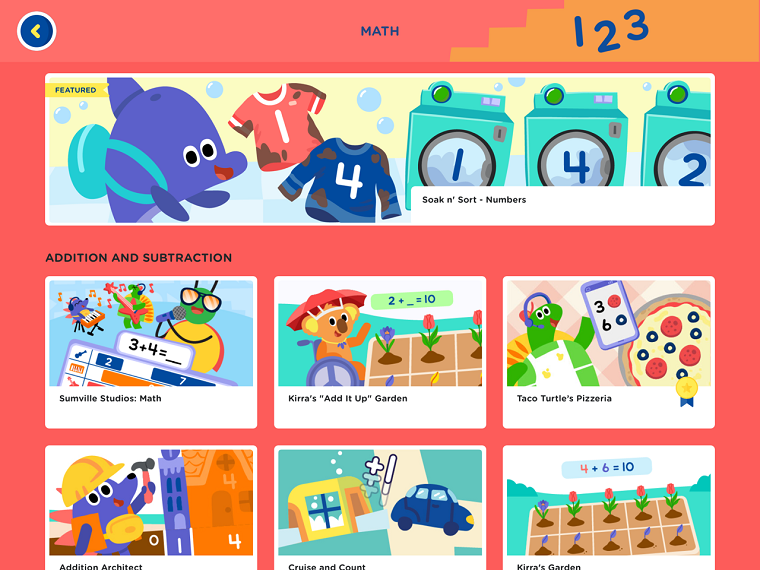Are you torn trying to decide between Homer vs ABCMouse for your child’s learning needs?
While both of these kids educational apps have their merits and can be excellent resources for young learners, deciding between them can be tricky.
After all, both platforms are pretty similar on the surface and are targeted at helping young kids build foundational skills like reading, math, and more.
However, when we look a bit closer and dig deeper into each platform’s features, there are some key differences that should be considered before you make your decision.
We’ve spent dozens of hours testing both apps (and having our kids use them as well), so we’ve become quite familiar with what each of them has to offer.
Our guide below will offer a detailed breakdown of ABCMouse vs Homer, comparing them side-by-side across multiple key decision points like pricing, age range, and overall curriculum. We also considered how the kids were able to learn with each program and any customization options that were included.
There isn’t a real wrong answer in the debate between Homer vs ABCMouse. That said, we do feel like children receive a more personalized approach to learning a variety of necessary skills with Homer that is less available with ABCMouse.
Please note that this comparison guide has been completely updated for 2023 to include all of the latest information on both apps so you can make the best decision for your family.
Disclosure: Some of the links in this article are affiliate links, meaning at no additional cost for you, we might get a commission if you click the link and purchase.
What is Homer?
 HOMER - The Essential Early Learning Program and App for Kids 2-8
HOMER - The Essential Early Learning Program and App for Kids 2-8
HOMER is a personalized learning app designed to help kids fall in love with learning. There are over 1,000 learning activities across all subjects, and the content is tailored to your child's age and interests.
Homer Learn & Grow is an early childhood learning app that is designed for children ages 2 to 8.
The program focuses on a mix of core curriculum mixed with soft skills that will enhance education and life skills. Children will learn things like Reading and Literacy, Math, and other important things like creativity and social and emotional learning.
Every exercise is somewhat adaptable and as your child uses Homer the program adjusts the difficulty of each lesson to suit the needs or skills of the user.
Learning is done primarily through music and songs, games, videos, and puzzles.
Each lesson or game comes with easy-to-follow instructions offered verbally.
If you have more than one child, there’s no need to worry. The annual Homer subscription can be used for up to four children who can have their own individual profiles.
As they learn they will follow a clear path, finishing one activity and then moving to the next when they are ready.
There are no ads or distractions included. Each profile has a customization option, so the kids can choose a theme for their learning space that suits them.
The curriculum was created by early childhood education experts and educators to ensure that every child that uses Homer has a jumpstart on their education and a proper chance to succeed.
Pricing is reasonable for an educational app of this kind. In fact, it’s priced like other similar programs on the market.
Right now, you can get an annual subscription for $79.99, which covers a full year for up to four children.
Homer comes with a free 30-day trial to start.
Pros & Cons of Homer
Pros
- Customizable profiles allow your children to design a page filled with popular theme options
- You can personalize just about everything, allowing changes based on interest, age, or skill level
- Research and reviews show that kids love Homer and parents also approve
- Homer is a safe, secure option without ads
- Multiple games and activities will keep your children engaged and interested in learning
- Multiple payment options at a reasonable price
- If you have more than one child, you’ll have the ability to make up to four profiles
- You get 30 days to try Homer for free, which should be more than enough time to see the benefits
Cons
- Homer does not have as much readily available content as some other educational providers
- Some parents feel that certain lessons can be too hard or too easy based on their child’s age
What is ABCMouse?
 ABCmouse
ABCmouse
ABCmouse is one of most popular learning apps for little kids ages 2-8. It includes educational games, books, puzzles, and more to help kids learn in a fun, effective manner.
ABCMouse is similar to Homer and other educational apps for younger children.
The ABCMouse app was designed with children between the ages of 2 and 8 in mind. They cover learning levels ranging from toddlers all the way up to 2nd grade.
Each lesson is structured like a game, promoting fun while learning.
All of the core subjects are included, so kids will learn about Reading, Math, Science, and Social Studies.
ABCMouse is intuitive, so it learns as your child learns. It considers any educational struggles or strengths your child is having with the current lessons and can adjust them as needed so they can continue to succeed.
ABCMouse also has an app for older children, so if your kids love ABCMouse, but are aging out and becoming too advanced for this app, they can continue with Adventure Academy, which is suitable for kids between the ages of 8 and 13.
ABCMouse is free of ads and distractions.
The goal is to give your child a well-structured environment that promotes learning in a fun and positive way.
If you have multiple children, one ABCMouse account will allow you to make up to three profiles. You will receive four profiles in total, but one profile is for the parents. This profile can be used to track your child’s progress as they complete each level and activity.
Pricing is reasonable. In fact, you’ll be able to choose from multiple plans. You can pay monthly, bi-annually, or annually. A monthly subscription will cost you $12.99 per month, but if you choose a 6-month membership you’ll only pay around $30. The annual subscription is available for $59.99.
ABCMouse comes with a 30-day free trial.
Pros & Cons of ABCMouse
Pros
- Age appropriate for learners aged 2-8 years old
- Thousands of activities are available
- A ticket/reward system helps to encourage learning
- Parents have a tracking system to understand how their children are progressing
- Families can create up to four profiles per household – 1 for parents and 3 for the kids
- Multiple subscription options
- You can try ABCMouse free for 30 days!
Cons
- The ABCMouse app feels less intuitive or advanced than similar apps
- Some customization is available, but it’s lacking compared to Homer
- Despite offering 4 profiles, one profile is for the parent, so only three kids can be signed up per account
- Some of the content feels older and less inspired
Price Comparison: Homer vs ABCMouse
Both Homer and ABCMouse are pretty even where pricing is concerned. While there are occasionally sales, the average prices are nearly identical.
ABCMouse offers a couple of different pricing plans. You can choose a monthly or an annual plan. ABCMouse pricing changes some based on the plan that you choose. The monthly plan is available for $12.99 per month. This price changes drastically if you buy the annual. You’ll pay just $59.99 for the full year, but you can often find the annual plan on sale for around $45!
In contrast, Homer pricing includes an annual plan for $79.99 which works out to $6.66 a month. There is also a monthly plan for $12.99 a month. The cool thing about the annual plan, though, is that it comes with some extras, like 8 online classes, digital workbooks, and up to 4 child profiles allowed.
Winner: Homer. If you’re going by pricing alone, both options are reasonably priced and suitable for most families, whether they have one or multiple children. However, we do love that Homer offers extra perks and goodies with their Annual Plan!
Age Comparison: Homer vs ABCMouse
Homer and ABCMouse are both geared toward children between the ages of 2 and 8 years old.
Both services have lessons and activities that can be made easier or more difficult based on a child’s needs.
Both services even offer programs for younger or older children.
Homer has a Learn and Play option for children under 3, which serves as an early learning option. Meanwhile, ABCMouse has Adventure Academy, which is available for children above the age of 8.
If you have children between the ages of 2 and 8, both Homer and ABCMouse could work for you. When it comes to age, it could come down to which program seems to work best for your child.
With so many similarities, it’s no wonder Homer is one of the most popular ABCmouse alternatives out there.
Winner: Tie. Both apps are targeted at the same age range, so it comes down to which one your child enjoys the most.
Educational Comparison: Homer vs ABCMouse
In terms of subjects, both Homer and ABCMouse offer core subjects that you might expect from a childhood learning app.
Both services teach the basics.
At ABCMouse, the subjects include things like Art, Math, Reading, Science, and Social Studies.
On the other hand, Homer offers Math, Reading, Social and Emotional Learning, and Thinking and Creativity.
When it comes to learning, both Homer and ABCMouse use similar approaches to teach everything from sight words to basic math and more.
First, you’ll notice that kids have a clear onscreen learning path that they can follow from one lesson or activity to the next. Often, more complex ideas will be broken down into more than one lesson, as to give your child time to understand and absorb the knowledge before moving on to something new.
As your child learns, both Homer and ABCMouse, can determine and alter the content based on the difficulty of learning. So, if your child is having a problem or if things feel too easy for them, the work will be adjusted to ensure for a productive and encouraging learning environment.
Additionally, both services employ games, videos, storytime, and other fun tactics to entertain and educate kids. This gets them learning in a stress-free environment and allows them to have fun, which makes them want to learn even more!
Winner: Homer. While both ABCMouse and Homer offer similar educational opportunities, we feel the edge goes to Homer. The fact that they offer a mix of classic curriculum with other necessary skills promoting creativity and emotional development puts them just a little ahead of ABCMouse. Both services are great and incredibly similar, but we feel Homer goes above and beyond in this regard.
Device Availability Comparison: Homer vs ABCMouse
Both Homer and ABCMouse offer a broad range of options when it comes to connecting to each program. You can use iOS or Android phones or tablets. Another option is a standard desktop computer or a laptop.
One thing to note is that the ABCMouse experience is the same across all platforms.
Right now, Homer’s app is top-notch and is the newest available look. The computer browser version of Homer is a bit more outdated in comparison, but it still looks nice, and all the lessons, activities, and content are the newest available version.
Again, ABCMouse and Homer are very similar in the number of devices you can connect to. Both services offer you the chance to connect on computers and mobile devices, which means your kids can enjoy learning at home or from just about anywhere!
Winner: ABCMouse slightly edges out Homer here due to the fact that Homer’s computer version is a little behind its apps on mobile devices.
Homer vs ABCMouse: Overall Winner
At the end of the day, both Homer and ABCMouse are solid choices in our book, but Homer slightly edges it out when compared side-by-side.
Both services offer a chance to promote early childhood education in a comfortable and easy-to-learn manner for the kids. Whether you’re looking for help with reading comprehension or for a preschool learning app to promote early education, these services could offer what you need.
That said, we do feel that Homer is the better option of the two services when it comes to your child’s education.
Both options are nearly identical when it comes to things like device availability, pricing, and age range.
The difference lies in the fact that in addition to core skills, Homer also teaches and reinforces soft skills like communication, emotional understanding, and creativity. It also teaches essential thinking skills so that kids can develop problem-solving abilities and learn how to think more critically.
In the end, our decision is that Homer offers a better all-round educational experience for your little ones. With its engaging and interactive exercises, it helps kids learn essential skills while also developing their soft skills. Overall, the learning process on Homer is just a little more comprehensive in our opinion.
Both of these services are worth considering, but we feel that Homer offers a more full-service approach to learning that would be a benefit to any young child.
Click here to try Homer free today.
Have any more questions about ABCMouse vs Homer? Let us know by leaving a comment below.



